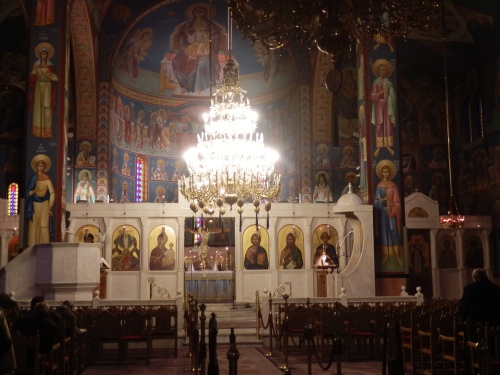
Κάποτε είχε πάει ένας κοσμικός στην Σκήτη των Καυσοκαλυβίων, για να γίνη Μοναχός.
Οι Πατέρες όμως της Σκήτης δεν τον δέχονταν, γιατί, εκτός που τήταν ράθυμος και αμελής, ήταν και πολύ σκανδαλοποιός και δημιουργούσε συνέχεια θέματα. Επειδή εκείνος αναπαυόνταν στην Σκήτη, παρακάλασε τους Πατέρες να τον αφήσουν να μένη ως λαϊκός και να εργάζεται καμιά φορά.
Έτσι λοιπόν πέρασε την ζωή του με ραθυμία και αμέσως μέχρι την ώρα του θανάτου του που έπεσε πιά στο κρεβάτι και ψυχοραγούσε. Οι Πατέρες όμως του συμπαραστέκονταν και βρίσκονταν συνέχεια κοντά του.
Μια μέρα ο ετοιμοθάνατος είχε έρθει σε έκσταση και έκανε νοήματα. Οι Πατέρες απορούσαν τι να συμβαίνη ! Όταν συνήλθε τους διηγήθηκε το εξής φοβερό:
Είδα τον Αρχάγγελο Μιχαήλ μ’ ένα χαρτί στα χέρια του, που είχε όλες τις αμαρτίες μου, και μου είπε:
«Βλέπεις, αυτά εδώ τα έκανες όλα , γι’ αυτόν ετοιμάσου να πας στην κόλαση».
Τότε εγώ του λέω:«Για κοίταξε, ανάμεσα σ’ αυτά τα αμαρτήματα, υπάρχει το αμάρτημα της κατακρίσεως».
Ψάχνει ο Αρχάγγελος και μου λέει :«Όχι , δεν υπάρχει»«Οπότε, του λέω, δεν πρέπει να πάω στην κόλαση, σύμφωνα με αυτό που είπε ο Κύριος . «Μη κρίνετε και ου μη κριθήτε»
Τότε ο Αρχάγγελος Μιχαήλ έσχισε το χαρτί με τα αμαρτήματά μου. Έτσι, Πατέρες μου, θα πάω στον Παράδεισο . Όταν μου είχατε πει ότι δεν κάνω για Μοναχός στην Σκήτη και εργαζόμουν ως λαϊκός και εκκλησιαζόμουν στον Κυριακό τις εορτές, είχα ακούσει τα λόγια του Ευαγγελίου «Μη κρίνετε , ίνα μη κριθήτε» και είπα : «Ταλαίπωρε , τουλάχιστον αυτό να εφαρμόσης», και αυτό με έσωσε δίχως άλλον κόπο». Μόλις τελείωσε αυτά τα λόγια, παρέδωσε την ψυχή του στον Αρχάγγελο Μιχαήλ.
http://agiameteora.net/
Why do we judge our neighbors? Because we are not trying to get to know ourselves. Someone busy trying to understand himself has no time to notice the shortcomings of others. Judge yourself — and you will stop judging others. Judge a poor deed, but do not judge the doer. It is necessary to consider yourself the most sinful of all, and to forgive your neighbor every poor deed. One must hate only the devil, who tempted him. It can happen that someone might appear to be doing something bad to us, but in reality, because of the doer's good intentions, it is a good deed. Besides, the door of penitence is always open, and it is not known who will enter it sooner — you, "the judge," or the one judged by you.
St. Seraphim of Sarov
 A very astute observation by Fr. John Romanides in Partistic Theology (pp. 34-35):
A very astute observation by Fr. John Romanides in Partistic Theology (pp. 34-35):
In the early Church, there was no special or official healer, because every Christian was a healer. Healing was the mission of the early Church. The missionary effort of the early Church was not like that of today’s Orthodox Church, which sometimes consists of advertising our beautiful beliefs and traditional form of worship as though they were nothing but products for sale. For example, we talk like this: “Take a look, folks! We have the most beautiful doctrines, the most beautiful worship, the most beautiful chanting, and the most beautiful vestments. See what a beautiful robe the bishop is wearing today!” And that sort of thing. We try to dazzle the with our staffs, our robes, and our head coverings so that we can carry out our missionary work. Of course, there is some sense and some success in doing missionary work this way, but it is not genuine missionary work like that of the early Church.
Today’s missionary work consists mainly of this: we enlighten superstitious people and make them Orthodox Christians, without trying to heal them. By doing this, however, we are just replacing one superstition with another. And I say this because when Orthodoxy is presented in this way and is offered in this way, how is it different from superstition? After all, when Orthodoxy is presented and offered as a Christianity that does not heal – despite the fact that healing is its primary task – how is it different than superstition?
matushka constantina
http://lessonsfromamonastery.wordpress.com/


